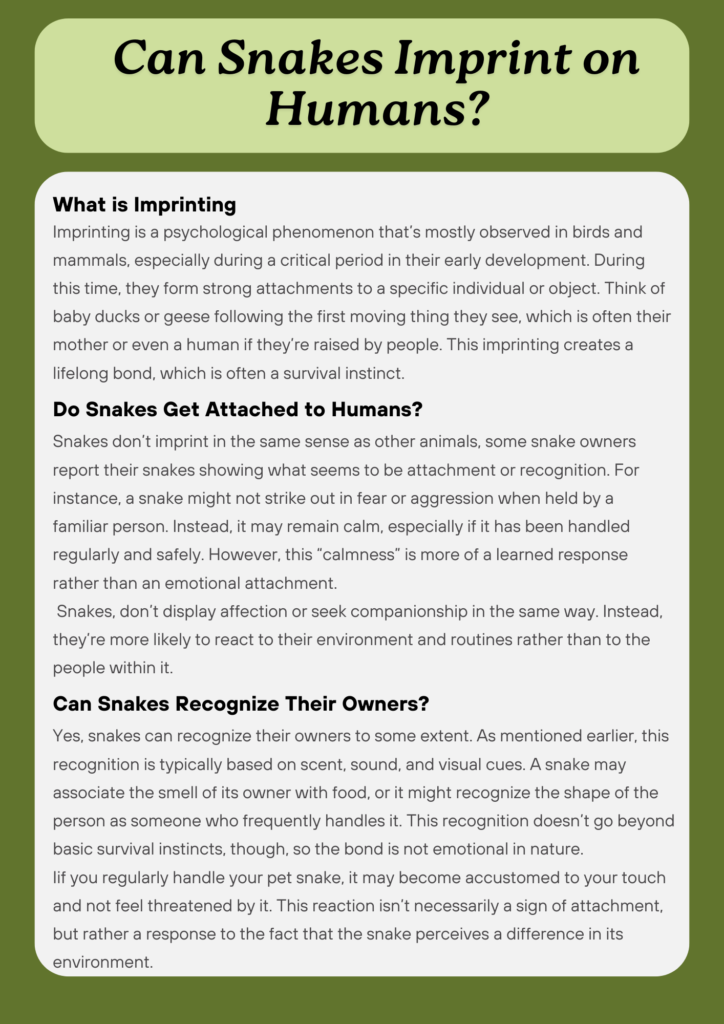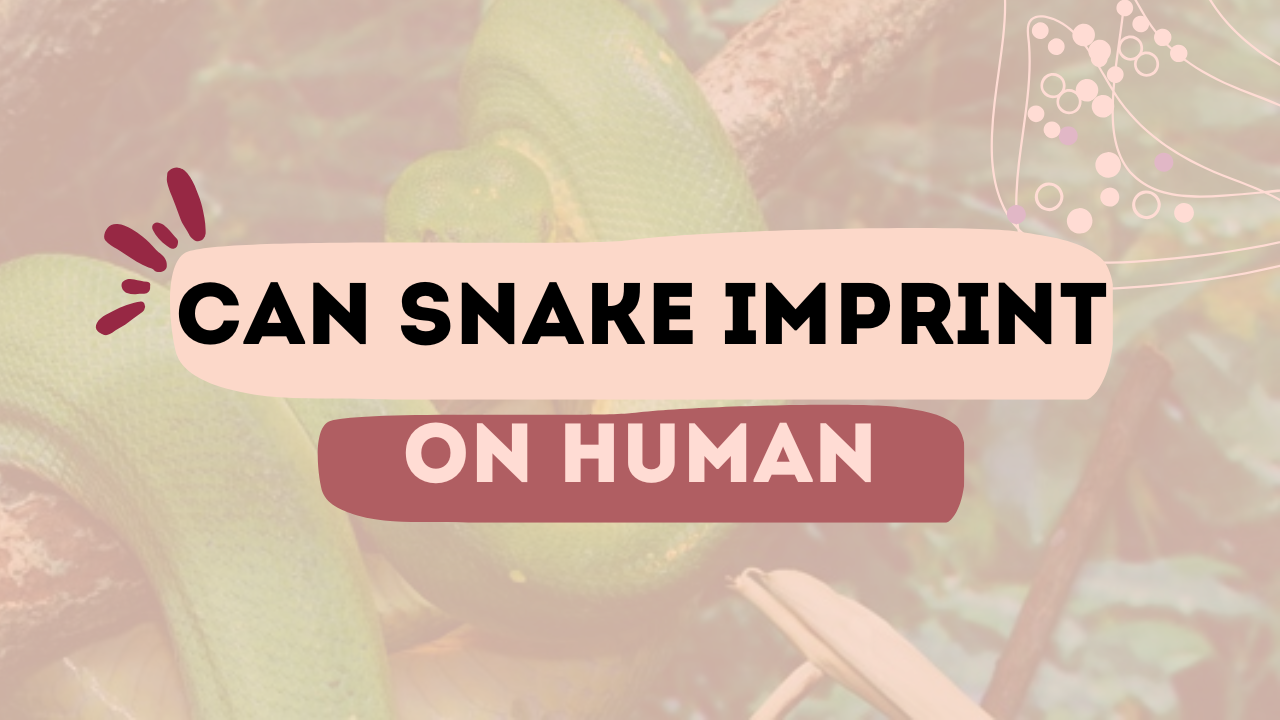Can snakes imprint on humans in the same way? Well, the answer might surprise you. While snakes do not imprint on humans like some other animals, they do develop a sense of familiarity and can, in certain circumstances, recognize their caretakers. However, this recognition isn’t the same as emotional attachment. In this article, we’re going to explore the science behind snakes and human interaction and find out just how connected snakes can really get with us. So, let’s dive into this slithery topic!
If you’ve ever wondered whether snakes can form a bond with humans, you’re definitely not alone. The concept of animals imprinting on humans, especially reptiles, is fascinating yet confusing. Many people have heard that certain animals, like ducks or even birds, can imprint on humans, but what about snakes?
What is Imprinting, Anyway?
First, let’s clarify what imprinting is. Imprinting is a psychological phenomenon that’s mostly observed in birds and mammals, especially during a critical period in their early development. During this time, they form strong attachments to a specific individual or object. Think of baby ducks or geese following the first moving thing they see, which is often their mother or even a human if they’re raised by people. This imprinting creates a lifelong bond, which is often a survival instinct. The animal recognizes the figure it imprinted on as a source of security, food, or protection.
But, when it comes to snakes, the situation is a bit different. Unlike birds or mammals, snakes don’t undergo this critical period of development where they naturally imprint on their caregivers. So, in short, snakes don’t “imprint” on humans in the way we often think about it. But can they still recognize us? Let’s find out!
Snakes and Recognition
Snakes are very different from the traditional animals you might think of when you hear the word “imprinting.” They lack the social structures and behaviors that might lead to this deep connection. Snakes, as solitary creatures, don’t need to rely on others for survival in the same way many birds or mammals do. They don’t have complex emotions, and they don’t create lasting bonds. But here’s the interesting part—while they might not form attachments, they can still recognize familiar humans. This recognition is mostly tied to scent, sound, and the predictability of the person’s behavior.
For example, a snake kept in captivity will likely become familiar with the scent and sound of the person who feeds it regularly. The snake might learn that the person who enters the room is the one who provides food, and thus it may become more relaxed in their presence. However, this is not an emotional bond. Instead, it’s more of a conditioned response to a routine. It’s similar to how a pet dog might get excited when it hears the sound of a can opener, not because it’s emotionally attached to the person, but because it associates the sound with food.

Do Snakes Get Attached to Humans?
Now, while snakes don’t imprint in the same sense as other animals, some snake owners report their snakes showing what seems to be attachment or recognition. For instance, a snake might not strike out in fear or aggression when held by a familiar person. Instead, it may remain calm, especially if it has been handled regularly and safely. However, this “calmness” is more of a learned response rather than an emotional attachment.
So, can a snake get attached to a human the way a dog or cat might? The answer is, probably not in the same way. Dogs, for instance, can form deep emotional bonds with their owners, seeking comfort and affection from them. Snakes, on the other hand, don’t display affection or seek companionship in the same way. Instead, they’re more likely to react to their environment and routines rather than to the people within it.
Understanding Snake Behavior
To understand the relationship between snakes and humans, it’s essential to take a deeper look at snake behavior. Snakes are solitary creatures, which means they spend most of their time alone. They don’t need to bond with other animals or humans for survival. Instead, their behaviors are instinct-driven and are centered around survival, food, and shelter.
For instance, when a snake is being handled, it may respond to the warmth of the human’s body or the fact that it feels safe in their hands. This isn’t necessarily affection, but rather comfort or a safe space. In the wild, snakes are more likely to avoid human contact altogether unless they’re cornered or feel threatened.
So, it’s fair to say that while a snake might tolerate human interaction, it’s not necessarily because it has formed an attachment. It’s more likely that it has learned to recognize the human as part of its routine—someone who provides food or interacts with it consistently.
Can Snakes Recognize Their Owners?
Yes, snakes can recognize their owners to some extent. As mentioned earlier, this recognition is typically based on scent, sound, and visual cues. A snake may associate the smell of its owner with food, or it might recognize the shape of the person as someone who frequently handles it. This recognition doesn’t go beyond basic survival instincts, though, so the bond is not emotional in nature.
For example, if you regularly handle your pet snake, it may become accustomed to your touch and not feel threatened by it. If someone else were to handle it, however, the snake might react differently. This reaction isn’t necessarily a sign of attachment, but rather a response to the fact that the snake perceives a difference in its environment.
Conclusion
So, can snakes imprint on humans? Not exactly. While snakes don’t form emotional attachments or bond with humans in the way some other animals do, they can learn to recognize their owners. They may show a calming response when handled by a familiar person, but this is more about learned behavior and recognition than affection or imprinting. Snakes simply aren’t the type of animal to create the kind of deep emotional connections that are typical of some pets. But that doesn’t mean they don’t value the routines and safety they associate with their human caregivers.
Whether you’re a snake owner or simply fascinated by these creatures, it’s clear that while snakes may not imprint on humans like some animals, they are capable of learning and adapting to their surroundings in unique and interesting ways.

